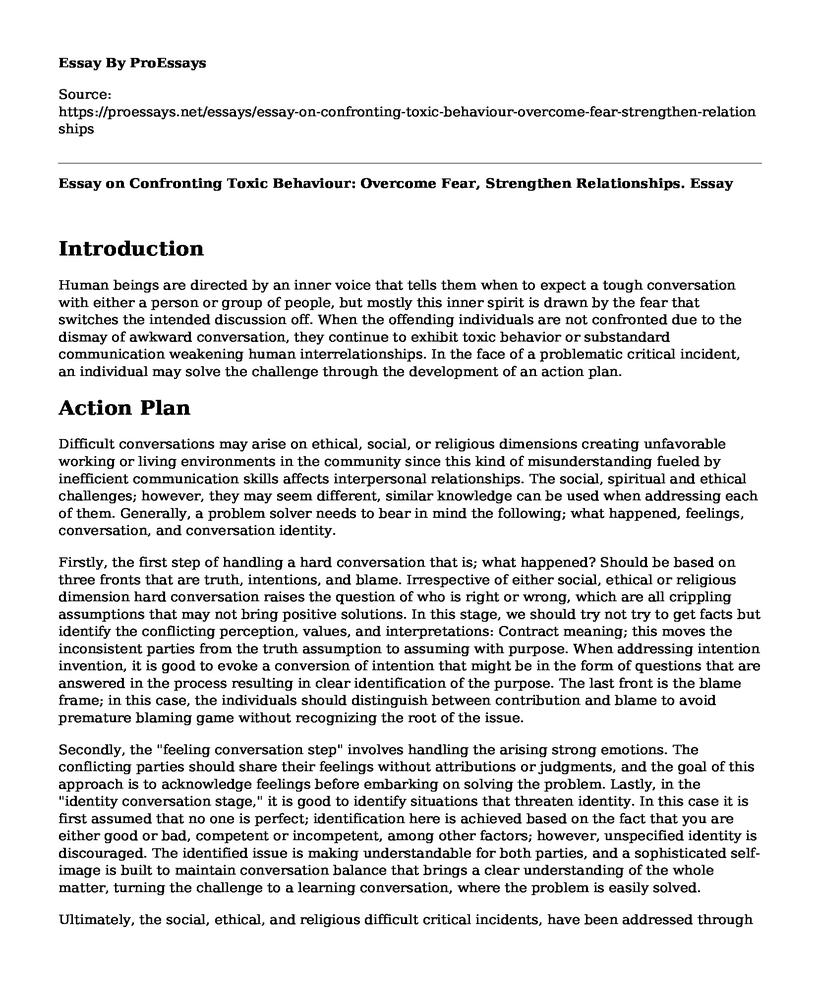Introduction
Human beings are directed by an inner voice that tells them when to expect a tough conversation with either a person or group of people, but mostly this inner spirit is drawn by the fear that switches the intended discussion off. When the offending individuals are not confronted due to the dismay of awkward conversation, they continue to exhibit toxic behavior or substandard communication weakening human interrelationships. In the face of a problematic critical incident, an individual may solve the challenge through the development of an action plan.
Action Plan
Difficult conversations may arise on ethical, social, or religious dimensions creating unfavorable working or living environments in the community since this kind of misunderstanding fueled by inefficient communication skills affects interpersonal relationships. The social, spiritual and ethical challenges; however, they may seem different, similar knowledge can be used when addressing each of them. Generally, a problem solver needs to bear in mind the following; what happened, feelings, conversation, and conversation identity.
Firstly, the first step of handling a hard conversation that is; what happened? Should be based on three fronts that are truth, intentions, and blame. Irrespective of either social, ethical or religious dimension hard conversation raises the question of who is right or wrong, which are all crippling assumptions that may not bring positive solutions. In this stage, we should try not try to get facts but identify the conflicting perception, values, and interpretations: Contract meaning; this moves the inconsistent parties from the truth assumption to assuming with purpose. When addressing intention invention, it is good to evoke a conversion of intention that might be in the form of questions that are answered in the process resulting in clear identification of the purpose. The last front is the blame frame; in this case, the individuals should distinguish between contribution and blame to avoid premature blaming game without recognizing the root of the issue.
Secondly, the "feeling conversation step" involves handling the arising strong emotions. The conflicting parties should share their feelings without attributions or judgments, and the goal of this approach is to acknowledge feelings before embarking on solving the problem. Lastly, in the "identity conversation stage," it is good to identify situations that threaten identity. In this case it is first assumed that no one is perfect; identification here is achieved based on the fact that you are either good or bad, competent or incompetent, among other factors; however, unspecified identity is discouraged. The identified issue is making understandable for both parties, and a sophisticated self-image is built to maintain conversation balance that brings a clear understanding of the whole matter, turning the challenge to a learning conversation, where the problem is easily solved.
Ultimately, the social, ethical, and religious difficult critical incidents, have been addressed through the development of an action plan that consists of three crucial steps; what happened, feeling conversation and identity conversation stage. Individuals experiencing tough conversation can solve their challenge by engaging each other in the three phases of the action plan.
Cite this page
Essay on Confronting Toxic Behaviour: Overcome Fear, Strengthen Relationships.. (2023, Feb 11). Retrieved from https://proessays.net/essays/essay-on-confronting-toxic-behaviour-overcome-fear-strengthen-relationships
If you are the original author of this essay and no longer wish to have it published on the ProEssays website, please click below to request its removal:
- Essay Example: Is Angie Bachmann Responsible for Her Gambling Debts?
- African Americans in the United States Essay
- Article Review: Developing a Spiritual Assessment Toolbox
- Knowledge of Intercultural Communication Essay
- Negative Influences of Big Data in the Work Place Essay
- Exercise Benefits for Youth and Elderly: Training Guide and Physiological Adaptations - Essay Sample
- Theory X & Y: Human Work Inspiration & Management - Essay Sample







